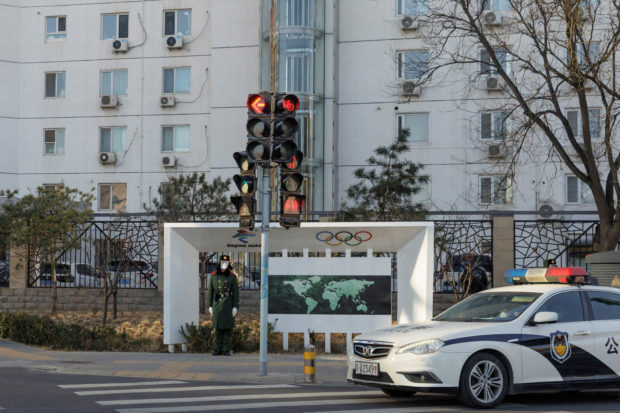US senators warn China against any violent crackdown on protests

A member of the Chinese People’s Armed Police Force wears a face mask as he keeps watch on a street amid coronavirus disease (COVID-19) outbreaks in Beijing, December 1, 2022. REUTERS/Thomas Peter
WASHINGTON — A bipartisan group of more than 40 US senators warned China on Thursday against any violent crackdown on protests there, saying it would do “extraordinary damage” to the US-China relationship.
The 42 senators, led by Democrats Dan Sullivan and Jeff Merkley and Republicans Mitch McConnell and Todd Young, said in a letter to China’s Washington ambassador Qin Gang that they were following the protests in China very carefully.
“We are also closely watching the Chinese Communist Party’s (CCP) reaction to them,” the senators’ letter said, noting Beijing’s violent crackdown on student protesters in 1989 that they said killed hundreds, if not thousands of people.
“We caution the CCP in the strongest possible terms not to once again undertake a violent crackdown on peaceful Chinese protesters who simply want more freedom. If that happens, we believe there will be grave consequences for the US-China relationship, causing extraordinary damage to it,” the letter said.
China has been rocked in recent days by widespread protests against the world’s toughest COVID-19 quarantine protocols, a show of public defiance unprecedented in since President Xi Jinping took power in 2012.
Article continues after this advertisementThree decades ago, in the aftermath of the Tiananmen Square crackdown, the United States and many Western governments imposed sanctions against China over the killings.
Article continues after this advertisementLast year, the United States, the European Union, Britain and Canada imposed sanctions on Chinese officials over alleged human rights abuses in China’s Xinjiang region, which Washington has labeled a “genocide” against minority Muslims.
On Monday, the White House said it backed the right of people to peacefully protest in China but stopped short of criticizing Beijing.
The Democratic administration’s cautious response drew Republican fire but some analysts said it was right approach given the volatile US-China relationship and the risk of playing into a Chinese narrative that accuses “foreign forces” of being behind dissent.